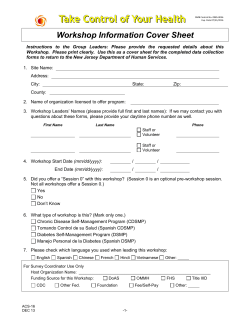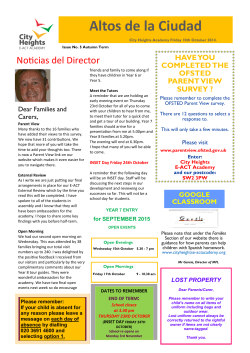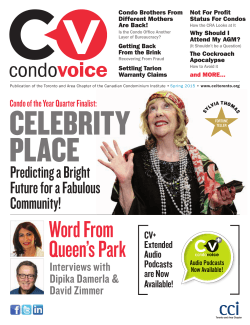
Document 330295
WESTERN ONTARIO UNIVERSITY DEPARTMENT OF MODERN LANGUAGES AND LITERATURES Sp 2220 – Spanish Conversation Fall 2014 / Winter 2015 (Please note this course outline is subject to change) Professor: Schedule: Alena Robin (Fall 2014) / Ana García-‐ Allen (Winter 2015) Tuesday 1:30-‐3:30 and Thursday 1:30-‐2:30 (Fall 2014) Monday 2:30-‐4:30 and Wednesday 2:30-‐3:30 (Winter 2015) 2 1 Email: Alena Robin: arobin82@uwo.ca Ana García-‐Allen: agarcia@uwo.ca Office: UC 254 (Alena Robin) UC 157 (Ana García-‐Allén) Phone: 519-‐661-‐2111, ext. 81599 (Alena Robin) ext. 81598 (Ana García-‐Allén) Office Hour: TBA I. COURSE DESCRIPTION AND OBJECTIVES A variety of guided conversations in Spanish dealing with a selection of issues in contemporary Hispanic World (Spain, North America, Mexico and the Caribbean, Central and South America). Students will develop their communicative skills in Spanish through discussion of a number of topics, ranging from social and political issues to TV and pop culture, films, music, fashion, food, and sports. No texts are required for the course. A good quality Spanish-‐English dictionary and Spanish dictionary are highly recommended. THE COURSE AND EVALUATIONS WILL BE ENTIRELY IN SPANISH. This course is design: • • • • To improve oral fluency through guided conversations and presentations in Spanish To expand students’ vocabulary in a way that will benefit both general conversation and discussion of specific topics To familiarize students with a variety of current issues in the Hispanic World through different sources, such as short readings, websites, videos, music, etc. To provide a solid foundation for advanced courses in the target language. 1 https://plus.google.com/111836790435904293698/posts 2 http://www.onetoonespanish.co.uk/conversational-spanish.htm II. LEARNING OUTCOMES: By the end of the course successful students will: • • • • • • • Speak with greater confidence and fluency in the target language Have a broader passive and active vocabulary Comprehend every-‐day spoken language Be able to express opinions and doubt, as well as agreement and disagreement Improvise questions and answers in a discussion on a prepared topic Be able to give meaningful oral presentations using only a list of key words Have a broader cultural awareness and an understanding of some current issues relating to the Hispanic world. III. PREREQUISITES: Antirequisite(s): The former Spanish 2202F/G, Spanish 2203F/G, Spanish 2218F/G and CLC 2218F/G, Spanish 2219F/G and CLC 2219F/G Corequisite(s): Spanish 2200 or Spanish 2200W/X or Spanish 2223, or permission of the Department. Unless you have either the requisites for this course or written special permission from your Dean to enroll in it, you may be removed from this course and it will be deleted from your record. This decision may not be appealed. You will receive no adjustment to your fees in the event that you are dropped from a course for failing to have the necessary prerequisites. IV. EVALUATION: Attendance and participation (20%): students are expected to participate actively in class discussions through expressing their own viewpoints about the topics and by responding to the professor’s or other students’ questions addressed to the class in general. Keep in mind that this is a CONVERSATION CLASS. Students are expected to attend every class unless medical circumstances prevent them from doing so (please see section below on Absenteeism). When absent, it is still the student’s responsibility to complete and turn in coursework on time and to catch up on the material covered in class. Students must inform their professor by email of any absence as soon as possible. In- class presentations: Celebrity –News (2 x 10%): In different moments of the semester, each student will present a celebrity and a news topic of the Hispanic world, in relation to the weekly topic. The presentations must be informative in their content, but also generate conversation among students. These presentations should be done in pairs (minimum of 10 minutes). Two weeks prior to their presentations students must send their topics to the professor and a link, copy of the reading and/or video they want to share with other students to be prepared for the presentations. Animation of debate (15%): According to the calendar of activities, students divided in small groups are expected to present a topic, animate and moderate the debate that their presentation will generate. Preferably by group of 4 people (this activity, in total, should cover the 50 minutes of the class). Two weeks prior to their presentations students must send their topics to the professor and a link, copy of the reading and/or video they want to share with other students to be prepared for the debate. Diary of expressions and vocabulary (3 x 5%): Throughout the semester, students are expected to maintain a diary of expressions and vocabulary acquired through the conversations. To follow the progression of the learning process of the student, the diary will be handed to the professor on 3 occasions: September 30, October 28, and November 25. This is to be done on an individual basis. Oral Exam (10% + 20%): The oral examinations will be with the professor, as a conversation. The first one will be done approximately one month after the beginning of the semester (5 minutes, 10%), the second one will take place towards the end of the semester (15 minutes, 20%). The first exam is to be done on an individual basis with the professor, the second will be done in pairs and will be on a topic covered during the semester (TBA). PLEASE NOTE: For group activities, the same grade will be given to all members of a group. Policy on Academic Accommodation for Assessments worth less than 10%: students will have to follow official accommodation process. IMPORTANT: Documentation is required for either medical or non-‐medical academic accommodation. Such documentation must be submitted by the student directly to the appropriate Faculty Dean’s office and not to the instructor. It will be the Dean’s office that will determine if accommodation is warranted. Please see Policy on Accommodation for Medical Illness (https://studentservices.uwo.ca/secure/index.cfm). If no official accommodation request is provided to the professor, late assignments will lose 5 points per day (on 100%). Assignments turned in a week after the due date (7 days) will not be accepted and will receive a grade of “0.” Oral assignments will be rescheduled when possible. Scholastic offences are taken seriously and students are directed to read the appropriate policy, specifically, the definition of what constitutes a Scholastic Offence, at the following Web site: http://www.uwo.ca/univsec/handbook/appeals/scholastic_discipline_undergrad.pdf. Support Services Please consult the following sites: Registrar Services (http://www.registrar.uwo.ca), and the same for affiliated university colleges when appropriate, and the Student Support Services (http://westernusc.ca/services/). Students who are in emotional/mental distress should refer to Mental Health@Western http://www.uwo.ca/uwocom/mentalhealth/ for a complete list of options about how to obtain help. The Department of Modern Languages and Literatures Policies which govern the conduct, standards, and expectations for student participation in Modern Languages and Literatures courses is available in the Undergraduate section of the Department of Modern Languages and Literatures website at http://www.uwo.ca/modlang/undergraduate/policies.html. It is your responsibility to understand the policies set out by the Senate and the Department of Modern Languages and Literatures, and thus ignorance of these policies cannot be used as grounds of appeal. IV. CALENDAR OF ACTIVITIES TOPIC AND DATE September 4 1. Introduction and presentation September 9 2. Tourism September 11 September 16 3. Cooking September 18 September 23 4. Visual Arts September 25 September 30 5. Social Issues October 2 October 7 6. Sports October 9 October 14 7. Economical issues October 16 October 21 8. Movie week October 23 October 28 9. Literature October 30 November 4 10. Political issues November 6 November 11 11. Science and Technology November 13 November 18 November 20 November 25 13. Music November 27 December 2 14. Conclusion ACTIVITIES Celebrity: News: Celebrity: News: Debate 1: Celebrity: News: Celebrity: News: Diary due Debate 2: Celebrity: News: Celebrity: News: Debate 3: Viewing and discussion of movie [Professor away to conference] Celebrity: News: Diary due Fall Study Break – No Class Celebrity: News: Debate 4: Celebrity: News: Debate 5: Comprehension Exam Comprehension Exam Celebrity: News: Diary due
© Copyright 2025

















